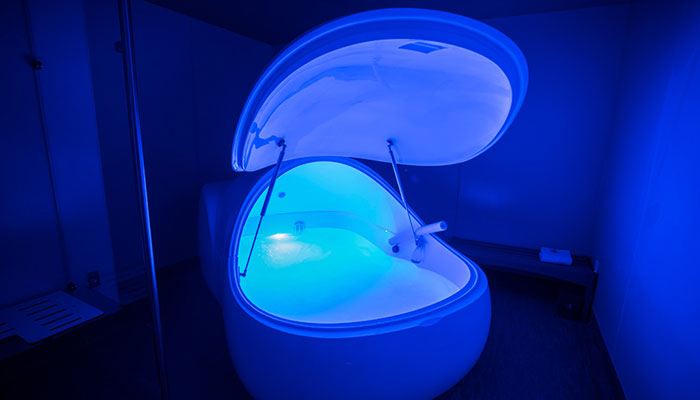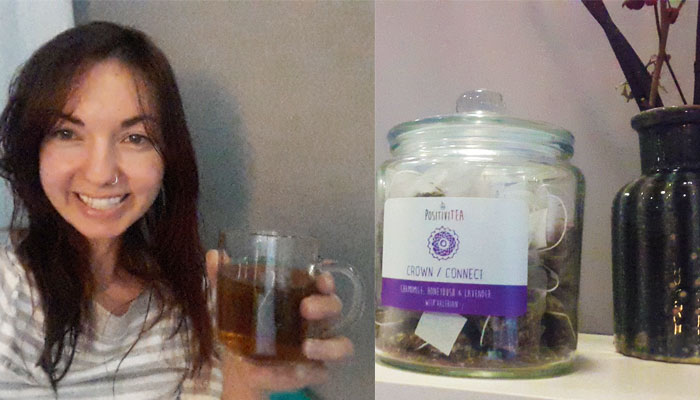
Floatation tank at Floatworks in Vauxhall where I had three one hour sessions of floatation therapy. Image source: Floatworks
Please note: I was kindly given three free floatation tank experiences in return for writing about my experiences
To some, it might seem strange or pointless to float in a pitch-dark pod filled with epsom salt water for an hour, without being able to see, hear, or smell anything.
In reality, this couldn’t be further from the truth. For me, floatation therapy, formerly known as sensory deprivation, felt like coming home — coming back to myself in a way that’s hard to describe.
Why I tried floatation therapy (formerly known as sensory deprivation)
I wanted to try floating because it’s supposed to help with lucid dreaming. It did! Two days after my second float, I had a lucid dream. However, this might have been my original intention, but as I delved deeper into this world, I realised I had a lot more to talk about than saying, ‘floating enhanced my dreams’.
Adopting the Zen Buddhist ‘Beginner’s Mindset’
During my first float inside the isolation tank, it took me a bit of time to settle. Did I float with my arms beside me or above my head? Did I focus on body scanning, my breath, or the space between my eyes? Was I supposed to be meditating at all? I experimented while the music played for the first 10 minutes and settled into stillness when the sounds faded to silence.
I closed my eyes and decided to take the Zen Buddhist approach of ‘Beginner’s Mindset’. If you’re unfamiliar with this term, it means having no preconceived ideas and approaching everything with the mindset of someone who is a beginner, so you can fully surrender and be present. Sometimes existing knowledge can be a hindrance.
I chose to let go and focus on my breath, which is how many meditation practices begin. Usually, however, when you meditate, many people will start to feel small aches and pains in their bodies after about 20 minutes. If you’ve ever tried Vipassana meditation, you will certainly be familiar with this. However, when you float, your whole body becomes weightless — you can’t feel it at all, so it’s much easier to go within. It could be described as a fast track to meditation.
For more information about Zen Buddhism and the Beginner’s Mindset, this is a brilliant book: Zen Mind Beginner’s Mind by Shunryu Suzuki
The interrelatedness of movement and stillness
Originally this was the purpose of yoga — to prepare the body to be able to sit in stillness and meditate. In order to be still, the body must first be moved, otherwise meditation becomes difficult. This play with opposites is something that really fascinates me. It’s applied Yin Yang. Within movement, there is stillness and within stillness there’s movement.

Abstract expressionist, Jackson Pollock practised something called ‘Action Painting’, where the creation of his art was made through movement that became like a dance. The artist and the art become ‘one’ during the creation process of his paintings, and stillness is found within movement.
If you dance, you might experience a sense of stillness or the feeling of going into a trance through the movement — even if from the outside it looks anything but still. Similarly, when you withdraw your senses from the external world and practise stillness for an hour through floating, you may experience a whole new sense of movement from within.
Thoughts come and go, memories surface, and visuals are created in the mind’s eye. And you start to realise there’s a whole world to be explored that in our everyday life gets ignored or never discovered.
Connecting back to the self
Floating for me was about connecting back to myself. There’s nowhere to go, no expectations — just you, and with this came a real feeling of bliss, deep relaxation and self acceptance in the moment.
I later found out that when you float, your brainwaves will often change into theta from beta (completing everyday tasks and problem solving) or alpha (a pleasant walk in nature).
Theta is most often experienced in deep meditation or the transition between sleep and wakefulness, and can be responsible for moments of pure bliss and deep relaxation.
Watch Joe Rogan’s amazing short video on being in a sensory deprivation tank
The five koshas or layers of being
Before I delve too much into the more esoteric stuff, I want to discuss the effects of floating on our physical bodies and overall wellbeing. I’m going to use a bit of yoga philosophy to help illustrate my point.
In yoga, there is a concept called the five koshas or five sheaths, which make up a person. The idea here is that we are not just our physical bodies, our thoughts, memories and beliefs. There are ever changing layers to our existence and in everyday life, we may only experience the first layer — Annamaya kosha (our food/ physical body).
Because the other sheaths aren’t physical, it can be hard to know they’re there, but according to yoga, we must care for all the layers of our being in order to achieve optimal functioning and health of our whole being. Practices such as floatation therapy that take a person inwards, are likely to be working on more of these five koshas as opposed to just the physical body.
Here’s a list of all five koshas/ layers of being:
- Food/ physical body sheath (Annamaya kosha)
- Energy sheath (Pranamaya kosha)
- Mind sheath (Manomaya kosha)
- Wisdom sheath (Vijnanamaya kosha)
- Bliss sheath (Anandamaya kosha)
How floating can benefit you physically and mentally
I didn’t float to help recover from any physical problems with my body. However, according to Floatworks, many people choose floating therapy to ease physical pain, aid muscle recovery or treat depression.
Floatation therapy can also decrease the production of cortisol (the stress hormone often associated with the fight, flight or freeze response), reduce blood pressure, boost immune function, and increase the production of endorphins.
It’s not just the concept of floating or withdrawing from your senses though — immersing yourself in high levels of magnesium which is found in epsom salts, is said to help muscles and nerves function properly. According to Salt Works, “The sulfates in Epsom salt help flush toxins and heavy metals from the cells, easing muscle pain and helping the body to eliminate harmful substances.”
I can say firsthand, I had my final floating session yesterday and am still feeling the effects today. My body feels amazing and I still feel thoroughly relaxed.
You can read more about the benefits of floating here
Floating in a fast paced life and exploring what lies within
Fast paced, everyday life can often keep us in a permanent state of striving from milestone to milestone, moving us away from the present moment. When this happens, it becomes almost impossible to experience any meaningful state of true contentment.
The beauty of inner practices, such as floatation therapy, is that they can help to bring you back to the ‘present’ wherever you are. I would also like to add that when you fully surrender with no expectations, you start to accept yourself fully for who you are and all your supposed imperfections. For many of us, that might be a rare thing, but something I believe is vital.
Floating is also an opportunity to take a glimpse at what lies behind our physical existence of the world and behind thought — behind the immediate surface chatter of sensations in the body and mind. This in essence is the study of transpersonal psychology — looking at the self beyond what we might ordinarily label as ‘the self’ such as our likes, dislikes, beliefs, thoughts and emotions.
It’s not, however, a subject purely for the intellect. It’s easy to philosophise on something like the true self, but I’ve come to terms with the fact that the mind alone will not be able to answer it.
Floating and lucid dreaming
Finally, this brings me back to my original intention for trying floatation therapy — to help me lucid dream. If you’re unfamiliar with lucid dreaming, it’s the ability to become conscious in the dreaming state whilst remaining asleep.
I want to be able to master this because lucid dreaming has the potential to help you become more creative, solve problems you can’t solve in the waking state, and enhance muscle memory. You can actually practise a sport or instrument you enjoy in a lucid dream and reap the benefits in waking life.
Meditating in a lucid dream is also ten times more effective than in the waking state according to Andrew Holocek (from the lucid dreaming course Dream Sculpting). And, it’s fun. You can go anywhere — time travel, explore other worlds such as space or the depths of the ocean, and you’re only limited by your own imagination.
There’s no current scientific evidence to suggest that floatation therapy helps to induce lucid dreams, but I can see how it would help. Lucid dreaming is essentially a practice in awareness. The more aware you are in the waking state, the more aware you’re likely to be in the dreaming state, and as a result become conscious of the fact that you’re dreaming.
After a session in a floatation tank, my senses felt heightened, the world felt clearer and I was a lot calmer as I walked out into the busyness of Vauxhall. When you live in London, where life is so fast, it can be easy to lose your ‘centre’ or feeling of groundedness.
Floating helps to bring you back to yourself, expanding those everyday moments, that can so often be taken for granted when you’re running around trying to do everything at once. It’s these ‘everyday’ moments, however, that we must pay attention to because these are the moments that make up our lives.
Final thoughts
Thank you to Jack and the rest of the team at Floatworks for my three incredibly blissful floating sessions, and taking the time to chat to me about floating in more depth. Very much appreciated.
For more information about Floatation therapy or to book your first session, you can find everything you need to know on the Floatworks website. They’re based in Vauxhall, London, and they’re currently offering discounted monthly New Year memberships which can be shared between family and friends.
If you’ve floated before, I’d love to hear your thoughts, experiences and tips. Did floating help to improve your life? Did it meet your expectations? Do you float with your eyes open or closed? What did you experience in the tank? Share your thoughts in a comment below.
Finally, I received three floatation therapy sessions for free from Floatworks in return for writing about my experiences on my website Thought Brick. I am also a Dream Sculpting affiliate, which means if you buy the lucid dreaming course through my site, I will make a commission.


